|
As human beings, we all experience grief at some point in our life - relationships end, jobs change, people relocate, pets pass away, and we lose loved ones.
Grief is everywhere for all of us - yet our society does a poor job allowing people to grieve. I want you to hear that it is ok to grieve and it is normal to struggle with how to continue living your life while dealing with grief. Grief hurts. Grief is overwhelming. Grief is confusing. Grief is much more than the 5 stages you may have heard about (Denial, Anger, Bargaining, Depression, Acceptance). Allow yourself to feel your feelings and be kind to yourself. If you are struggling with grief right now, what is one thing you can do this week to allow yourself to feel your feelings? Can you write about your loss? Can you talk about your loss with someone? Can you spend some time someplace that makes you feel connected to the person or thing you lost? How can you be kind to yourself as you grieve? (Read this post on the Changing Perspectives Online Facebook Page) ********* If you are grieving, Confessions from the Couch: Finding Hope and Resilience in Grief - A Grief Journal and Guide After Loss, is the resource you need. This 116 page, full-color grief guide and journal will help you find hope and resilience in your grief journey. Get your copy today - BUY NOW
0 Comments
As I write this message today, the sun is shining brightly, my windows are open, and the sounds of spring are all around me.
My favorite tree in my backyard is in full bloom and the birds almost seem to be smiling as they dance their way around the lawn in the morning. There is a hopefulness that seems to be filling the air right now. But just because nature is coming alive all around us and each day brings more flowery blossoms everywhere we look, it doesn't mean that we all are feeling that same rebirth or rejuvenation. The harsh reality is that so many of us are suffering right now. If you look beyond the flowers and sunshine and song birds, you can see it on the faces of some of the people around you. There is something extra hard about grief and pain and suffering when the outside world is marching forward towards brightness and hope. If you are someone right now who can't yet feel the hopefulness of spring, hear me when I say that it is ok. It is ok to feel your feelings. It is ok to let yourself grieve. It is ok to not be ready to enjoy spring. But don't suffer in silence. Be brave and reach out to a friend. Share with them how you are feeling and maybe even ask them to come and sit with you. Wherever you are in your season of life is ok right now - even if you are in winter when the world around you is in spring. No winter ever lasts forever. Your spring will come eventually. Until then, keep holding on. (View this post on the Changing Perspectives Facebook Page) ********* If you are grieving, Confessions from the Couch: Finding Hope and Resilience in Grief - A Grief Journal and Guide After Loss, is the resource you need. This 116 page, full-color grief guide and journal will help you find hope and resilience in your grief journey. Get your copy today: BUY NOW There are moments in life that hurt big.
Like, really big. Moments that shatter your heart into a million pieces. Moments that make you question the point of it all. Moments that make you doubt the future of humanity. Moments that make it hard to find hope or light. Moments that make you want to scream, cry, and shout. Moments that make you feel completely out of control. Moments that make you feel like you can’t find any air to fill your lungs. Moments that make you feel like you are falling apart. Moments that make you actually fall apart and send your world crumbling down around you. When those moments hit you - and they will - because it seems no one is immune to moments like that, remember to reach out and hold on. Reach out even if you can’t see where you are reaching. Hold on even if it feels like holding on is the last thing you can do. Reach out and believe that the people that love you most will find their way to you. Hold on and remember that even the darkest moments are just moments in time. Those moments will move on, leaving new moments in their place. And in those new moments you will find love, support, and hope. Keep reaching out. Keep holding on. Better moments are ahead. They have to be. ********* If you are grieving, Confessions from the Couch: Finding Hope and Resilience in Grief - A Grief Journal and Guide After Loss, is the resource you need. This 116 page, full-color grief guide and journal will help you find hope and resilience in your grief journey. Get your copy today: BUY NOW *********
If you are grieving, Confessions from the Couch: Finding Hope and Resilience in Grief - A Grief Journal and Guide After Loss, is the resource you need. This 116 page, full-color grief guide and journal will help you find hope and resilience in your grief journey. Get your copy today: BUY NOW Sometimes when I walk into a patient's room I can feel their emotion before they say a word.
This morning was one of those times. The grief hung thick in the air and was visible on my patient's face as soon as I entered her room. As if she had a shameful secret that she had been saving for my ears only, she quickly shared with me recurring feelings of guilt and sadness about her daughter, husband and brother - all deceased. Her usual cheerful, bright mood had been replaced this week with irritability, restlessness and a great deal of self-doubt. Casting her eyes down at her hands and sighing loudly she said, "Something's wrong with me. I looked down at my hand at Bingo last week, saw my ring and started crying about my husband. That's not normal. I'm not normal." I'm willing to bet that, at some point or another, all of us have thought this very same thought: "I'm not normal." You know the feeling, suddenly, out of nowhere, we are reminded of a loss in our lives. A rogue wave of grief, sadness, despair washes over us without warning and suddenly we are drowning in our sorrow. Again. It's as if the loss has happened again. Days, months, years may have passed since the loss but it feels brand new again. Right behind this wave of grief comes another wave - a wave of embarrassment and shame. What do we often say when this happens in front of someone else? "I'm sorry." We place intense pressure on ourselves to keep our feelings inside and to manage the grieving process in a neat, tidy, orderly and proper manner. It's easy to see where this pressure comes from; just look at what happens when we suffer a loss. Most employers provide their employees with a mere 3 days of bereavement leave after the loss of an immediate relative. 3 days. 3 days? 3 days!! After those 3 days the message begins to creep in from a number of areas that it's time to pull yourself together, stop crying and move on. Guess what? That message is wrong. Grief doesn't go away. The wave doesn't crest, crash on the shore and disappear. It stays with us. Forever. The hole in our heart never goes away. It never heals. There is no closure. Grief is forever. When we lose someone, that loss stays with us. It changes us. It's always there, just beneath the surface. It doesn't mean it breaks us or ruins us or takes away all hope. It just becomes a part of us and it is certainly not a part of us that should bring us shame. So, sometimes, when we look down at our hand and catch sight of our deceased husband's wedding ring on our finger, we grieve all over again. Nothing is wrong with us. We are normal. Imagine what would happen if we stopped feeling embarrassed about our grief, stopped apologizing, stopped trying to control and contain it and just acknowledged it honestly and supported each other unconditionally. What if instead of saying, "something's wrong with me" or "I'm not normal" we said "This is grief and it's ok to show it. I'm just like everyone else." Wouldn't that feel better? (Originally published as my very first blog article from June 2016. View this post on Facebook) ********* If you are grieving, Confessions from the Couch: Finding Hope and Resilience in Grief - A Grief Journal and Guide After Loss, is the resource you need. This 116 page, full-color grief guide and journal will help you find hope and resilience in your grief journey. Get your copy today: BUY NOW It’s here.
That painful time of year has arrived. Despite the festive red cups at the coffee shops, the pretty twinkling lights everywhere, and the bright and cheerful holiday music, this time of year is excruciatingly painful for so many. They walk amongst you. They plaster on their fake smiles during work Zoom calls. They sit beside you making small talk at your kid’s basketball games. They chat about surface level topics over dinner at birthday parties. They stand quietly in line while waiting for their latte, willing back their tears. They pluck ornaments from the giving tree at the gym, desperate to find a way to find a glimmer of happiness right now. They are heartbroken. They are all too aware of the giant hole in their lives during the holiday season. The thought of not seeing their loved one at the holiday table makes them want to faint or scream or punch the wall or hide under the covers for days. They are all around you. And they are often silent. So silent. But if you listen, their silence is deafening. Society doesn’t grant them much permission to share their grief, to talk about their loved one, or to express their complicated feelings. After all, the holidays should be a joyful time and there’s always something to be thankful for. At least, that’s the message we send to them. “Be happy.” “Get over it.” “They wouldn’t want you to be sad during the holidays.” But when you are grieving, nothing is more lonely or less joyful than the holiday season - two long months of pure emotional pain and social pressures. So they push their pain down and carry on, pretending to be whole. But they aren’t. They are hurting. They are broken. Next time you are in your Zoom meeting, or at your kid’s basketball game, or at a gathering with friends, or in line at the coffee shop, take a moment and forget about festive cups, twinkly lights, and holiday music and listen. Listen to their silence. Look behind their fake smiles. Hear their hidden pain. Feel the silent weight they carry. Maybe you could even give them space to grieve, ask about their loved one, or just let them know you see them. They need it. Especially now. It’s here. ****** Download your free 7-page grief journal abs guide here: bit.ly/Griefjournalguide ***** This morning as I scrolled through social media, I saw multiple sites sharing the news of Chrissy Teigen’s and John Legend’s “pregnancy loss.” There was comment after comment and judgment after judgment about how they were wrong to be sharing something so “personal” with others and how they were selfish to take and post photos of themselves grieving with their baby.
Those attitudes, those statements, and those judgments are exactly what is wrong with our society and our understanding of grief. Can we please stop minimizing the pain felt from a miscarriage and infant loss? Can we please give space for people to grieve openly about it? Can we please stop sanitizing death, grief, and sadness to make it more palatable for others? Can we please stop denying that the death that Chrissy and John just experienced is something that couples across the world face every single day? Something awful has happened. A parent’s worst nightmare has come true. Their baby died. The baby they named, felt move, dreamed about, envisioned a future for, and talked about with their other children has died. It is real. It is grief. They are allowed to talk about it and express it — yes, even publicly and yes, even though it is difficult to see. When someone, celebrity or not, loses an aging parent we don’t say they should keep it quiet or private. We don’t balk at them for sharing photos. We don’t mock them for their sadness or grief. We don’t minimize their pain. Why can’t we show that same grace to couples after they lose a child? The answer is simple — because such a loss isn’t supposed to happen. We don’t want to think about it. We don’t want it to be real. We don’t want to bear witness to such pain. But, we need to do just that. Grief is grief. Loss is loss Death is death These are the things that remind us we all are the same — celebrity or not, rich or poor — we all lose someone close to us at some point and for a lot of people, that someone close is a child, an infant, or a baby that never gets to live outside of the body. Please, before you roll your eyes or say “Ew. Keep that private” consider the people around you — your friends, your family, your neighbors, your colleagues. I promise there are people in your life right now who have experienced similar loss and have kept their pain inside because people have told them sadness like this must be kept a secret. I sit with those people in my grief sessions and see the impact that the inability to grieve openly has on them. We need to do better for them. My heart breaks for Chrissy and John and every other parent that has felt what they are feeling right now — and there are a lot of them out there. I am so thankful to them for being willing to be brave in their pain and to demand space for their open grief. I hope that some day we all can afford all grievers that same kind of space — the space they need and deserve. “Can I ask you a random question?”
A question like this at the end of a therapy session is always enough to make a therapist’s heart stop. But today’s question was one that is probably on the minds of many people out there. “My friend just had a death in the family and I want to do something for him. Is it appropriate for me to bring him a donut from his favorite bakery?” First of all, I’d be hard pressed to find a time in which is wasn’t appropriate to bring someone a donut from their favorite bakery but that’s not the question right now. Second, of all. “Yes. Yes. One thousand times yes. Bring the donut. Always.” The most important thing any of us can do when someone we love is grieving is show up. Call them. Text them. Bring them donuts. Bring them dinner. Sit with them in silence. Sit with them and talk. Sit with them and cry. Sit with them and laugh. It doesn’t matter what you do so long as you sit with them in their grief and let them feel heard and seen. If you are questioning whether bringing your grieving friend a donut is appropriate, go get one right now. You won’t regret showing up for them and it will likely mean the world to your friend. If you have a friend who experienced a loss a few months ago or the anniversary of that loss is coming up, now is probably a great time to bring them a donut too. Lots of people show up in the beginning following a loss but then the world moves on, often leaving the griever behind. Chances are that you’ve got people out there that you care about, right now, who are grieving alone and in silence. Bring them the donut. Always. When someone we know loses a loved one, their support network instantly kicks into high gear. Food trains get organized. Go Fund Me accounts get created. Casseroles get tossed into ovens. We make phone calls to and spend time at the homes of the grievers. We show up at wakes, funerals, and memorials and give our best condolences, whispering “Let me know if you need anything.”
We really do a great job, right? Not quite. While we, as a society, do a great job in the initial days following a death, our support quickly fades away, leaving our friends who have suffered the loss of their loved one to suffer yet another loss — the loss of their support network. It turns out that a peculiar thing happens when someone dies. The loved ones left behind are too overwhelmed to know how to ask for help or even what to ask for that would give them support. So, they ask for nothing, waiting for their friends to instinctively know what to do. Meanwhile, their friends go silent, assuming that their grieving friends will call them when they are needed. So often these miscommunications and missed opportunities result in heartache, pain, and fractured friendships. It’s not surprising to see our inadequacies around providing support to a grieving friend. We are a death denying society. We don’t like to talk about death, dying or grief. It feels too heavy, messy and personal and when something makes us feel uncomfortable, our natural instinct is to turn away from it, stick our heads in the sand, and hope that it gets better over time. So, we show up at the beginning do all the things that society has told us are helpful and then we retreat, waiting for our grieving friend to take the lead. As a grief therapist, I spend my days holding space for grieving individuals. They spend their time with me crying, not just about their dead loved one but also about their friends who stopped showing up after the first few weeks of their grief. They feel more alone than ever before and are often quite shocked at how ill-prepared their support network seems to have been for them. If you are like most people I know, you would love to feel more equipped at how to best help your grieving friends. You don’t ever want your friend to feel like you abandoned them. Start by putting down the casseroles. Don’t send that text message that says “Let me know if I can do anything for you.” Instead, try one or more of the following tips to provide support to your grieving friend. It could be the greatest gift you ever give to someone. 1. Be there There are few things in life that can make you feel as powerless as watching someone you love have their heart broken. For many of us, we can only spend so much time in that uncomfortable place before we need find something to distract ourselves. Rather than running away from the pain, try to lean in to that discomfort and be there for your friend. Remind them that you care about them and will be there for them. There are no magic words you can say to make things better. Just being there with them physically is sometimes magical enough. 2. Ask questions Ask your friend what they need. Rather than saying “let me know if you need anything” or “I’m here if you need me,” be brave and ask things like “What will be the hardest part of this month for you?” or “What do you need to help you get through the season?” Encourage your friend to be honest with you about their needs. 3. Find a way to help, without being asked For many grieving individuals, the thought of asking for support is overwhelming, daunting and feels far too vulnerable for them. While they may benefit from having someone take their children to and from school, fix that old broken rock wall, pull out their summer patio furniture, or help with projects around the house, chances are pretty low that they will ever ask for that kind of help. Figure out a way, besides casseroles, that you can provide some functional help to your friend and then offer it. 4. Talk about their loved one For many of us, we have been conditioned to avoid talking about someone who has died. We don’t want to upset our friends and remind them of their loss. We don’t want to make their pain worse. Guess what? They probably are always thinking about their loved one. Their heart is always hurting. One of their biggest fears, especially if they are a parent who has lost a child, is that the world (and they, themselves) will forget their loved one. Say their name. If you knew them, talk about your memories of them. Talking about them will give your friend permission to also talk about them and doing so will help immensely with their grief process. 5. Include them Even though your friend may not feel much like socializing at times, continue to extend invitations. Don’t assume that just because they have declined your last four invitations means they will never be interested in hanging out with you again. That 5th invitation just may be the one that finally gets them out of their house. 6. Don’t take it personal When your friend turns down your invitation to your summer bbq, backs out of your girls’ night out at the last minute, or doesn’t return your text message right away, don’t take it personal. Sometimes grieving individuals simply don’t have the energy to socialize and it has nothing to do with their level of desire to spend time with you. When it comes to grief, there is no such thing is closure. There is no such thing as moving on. Your friend will always feel some level of grief about their lost loved one. Some days that loss may feel as heavy as a boulder, completely weighing them down. Other days it may feel like a small pebble in their pocket. No matter how heavy or light their grief may feel from day to day, the griever will still feel its presence every day for the rest of their life. Wouldn’t it be wonderful for your grieving friend to feel your supportive presence beside them through it all? |
GriefGrief is everywhere for all of us - yet our society does a poor job allowing people to grieve. It is ok to grieve and it is normal to struggle with how to continue living your life while dealing with grief. Archives
June 2023
Categories
All
|
Sign Up For the Changing Perspectives Newsletter
Changing Perspectives with Jenni Brennan is supported by its audience.
When you purchase through links on this site, an affiliate commission may be earned. Learn More.
When you purchase through links on this site, an affiliate commission may be earned. Learn More.
Changing Perspectives Copyright © 2023
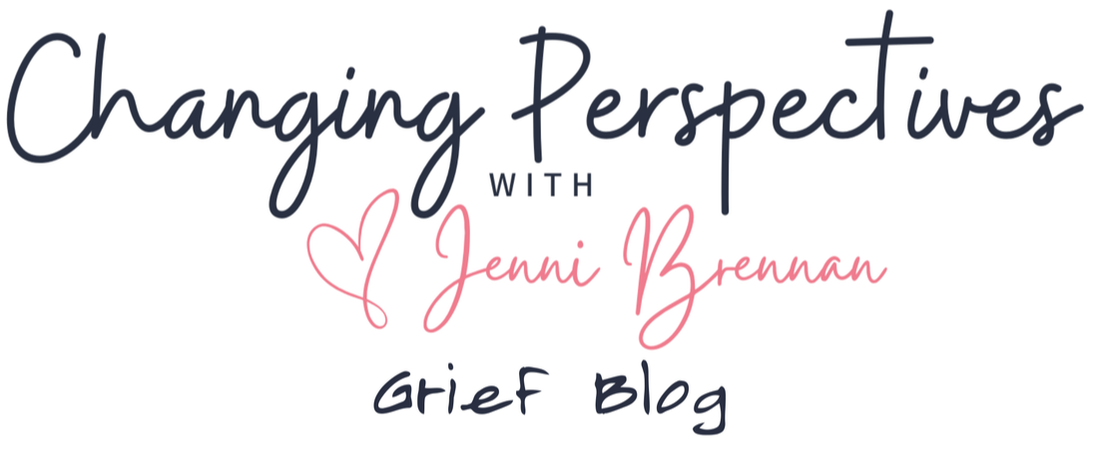

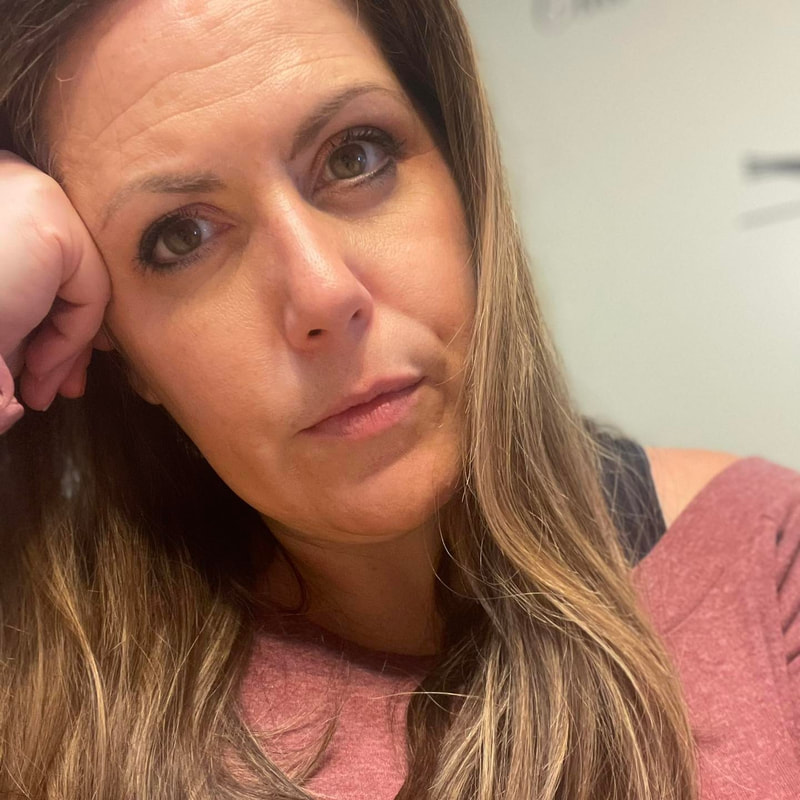

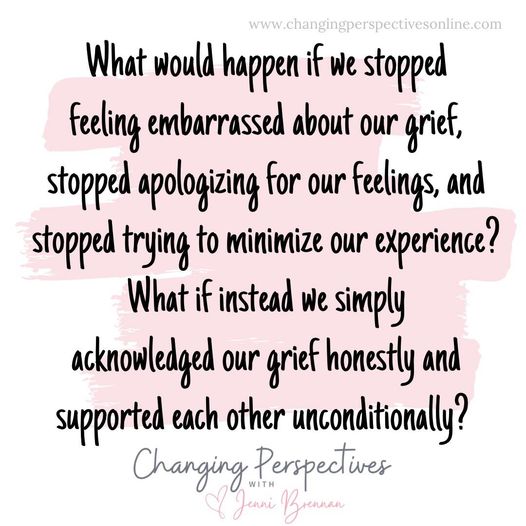
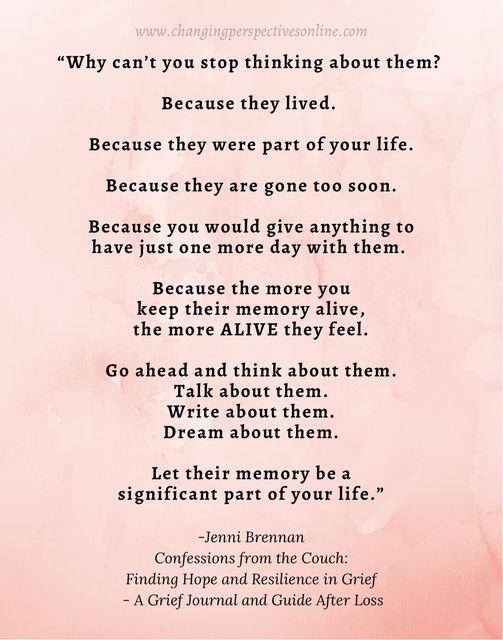
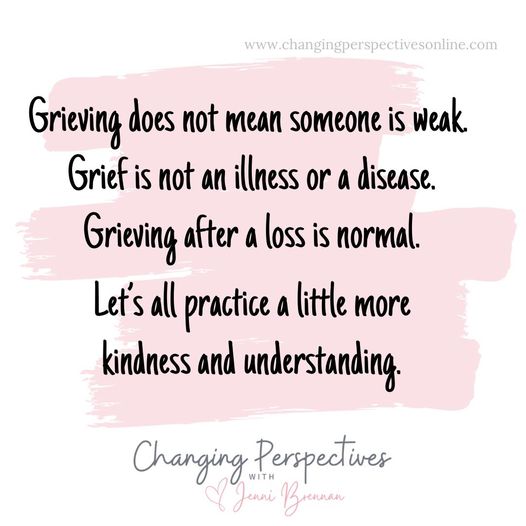
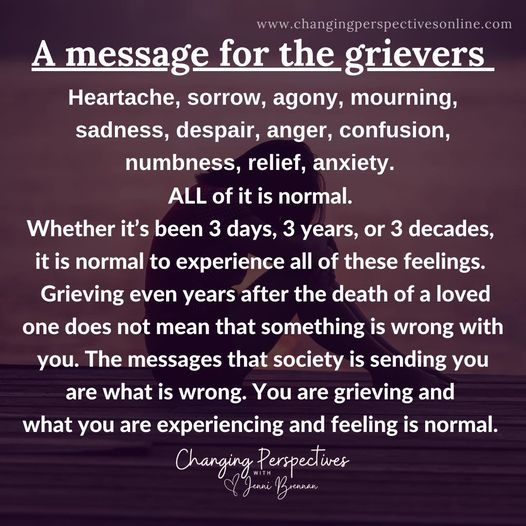
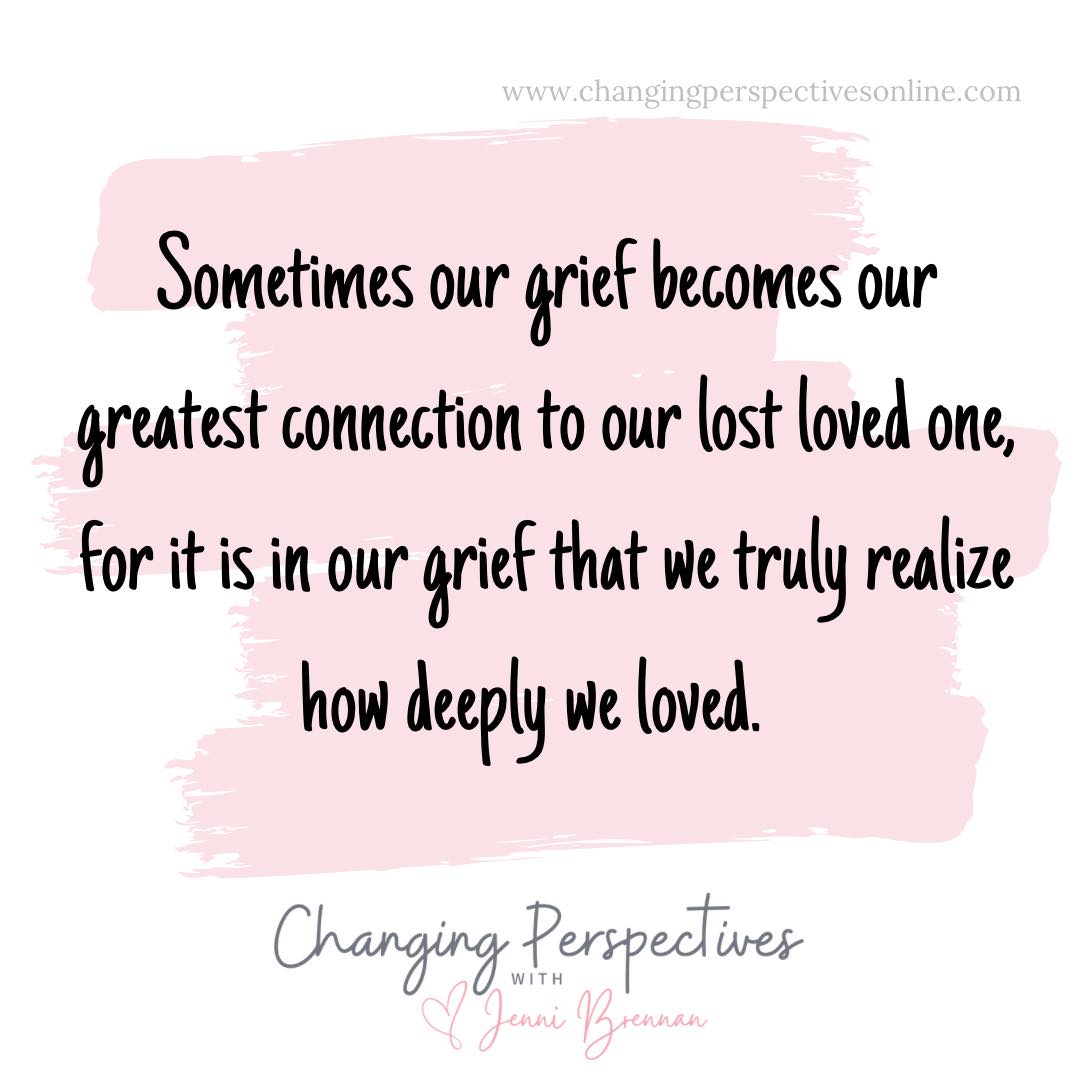

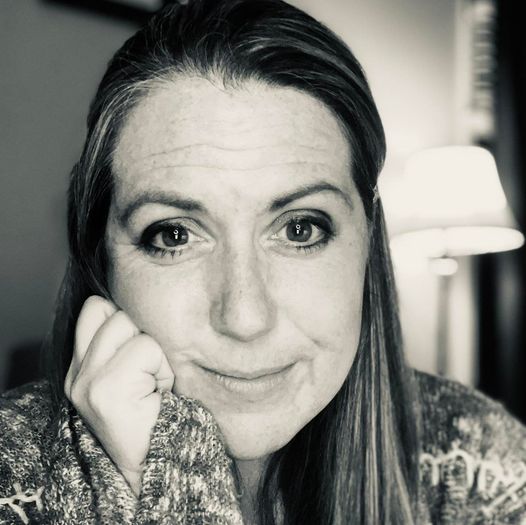


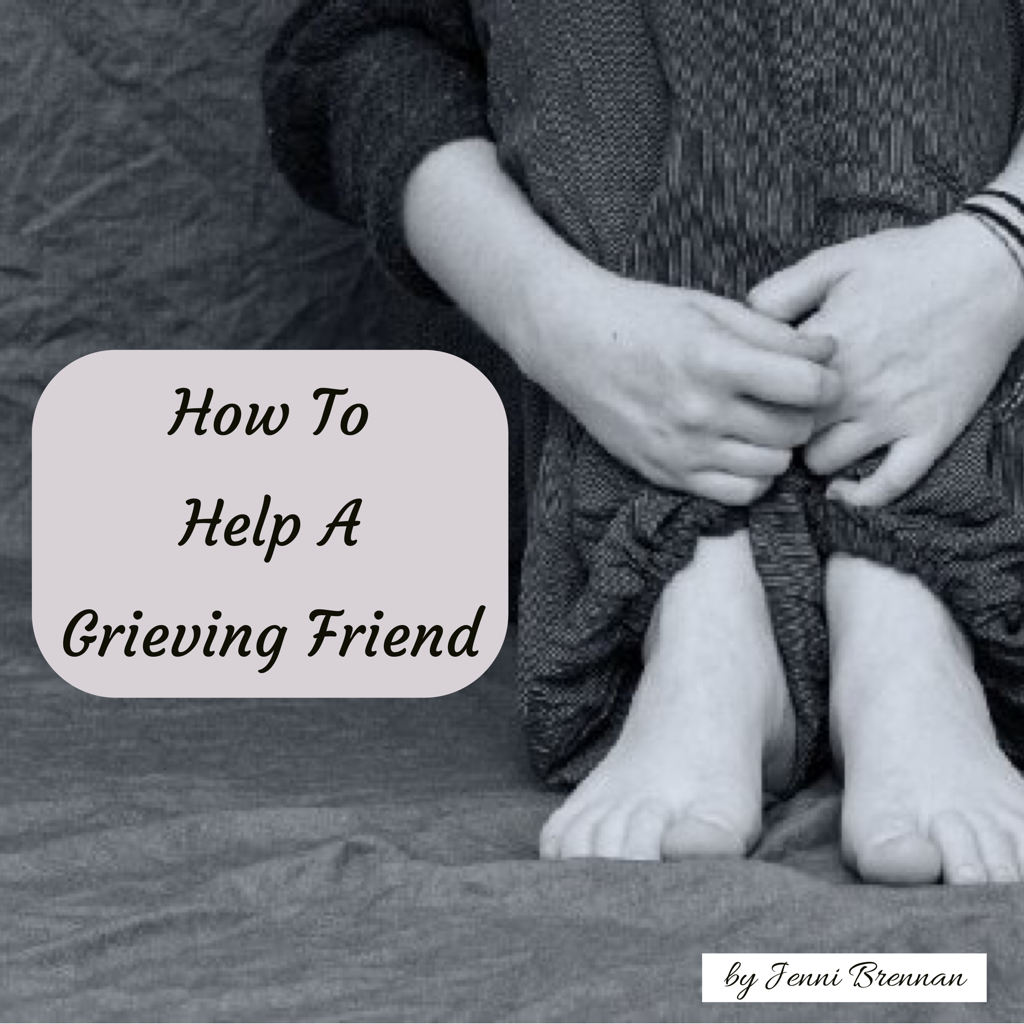
 RSS Feed
RSS Feed
